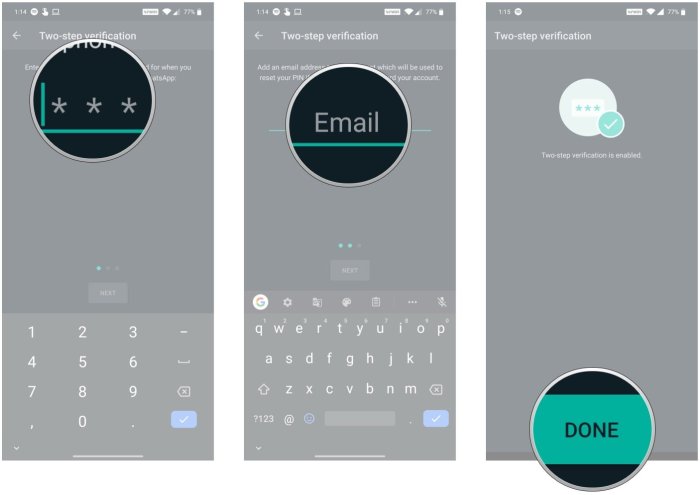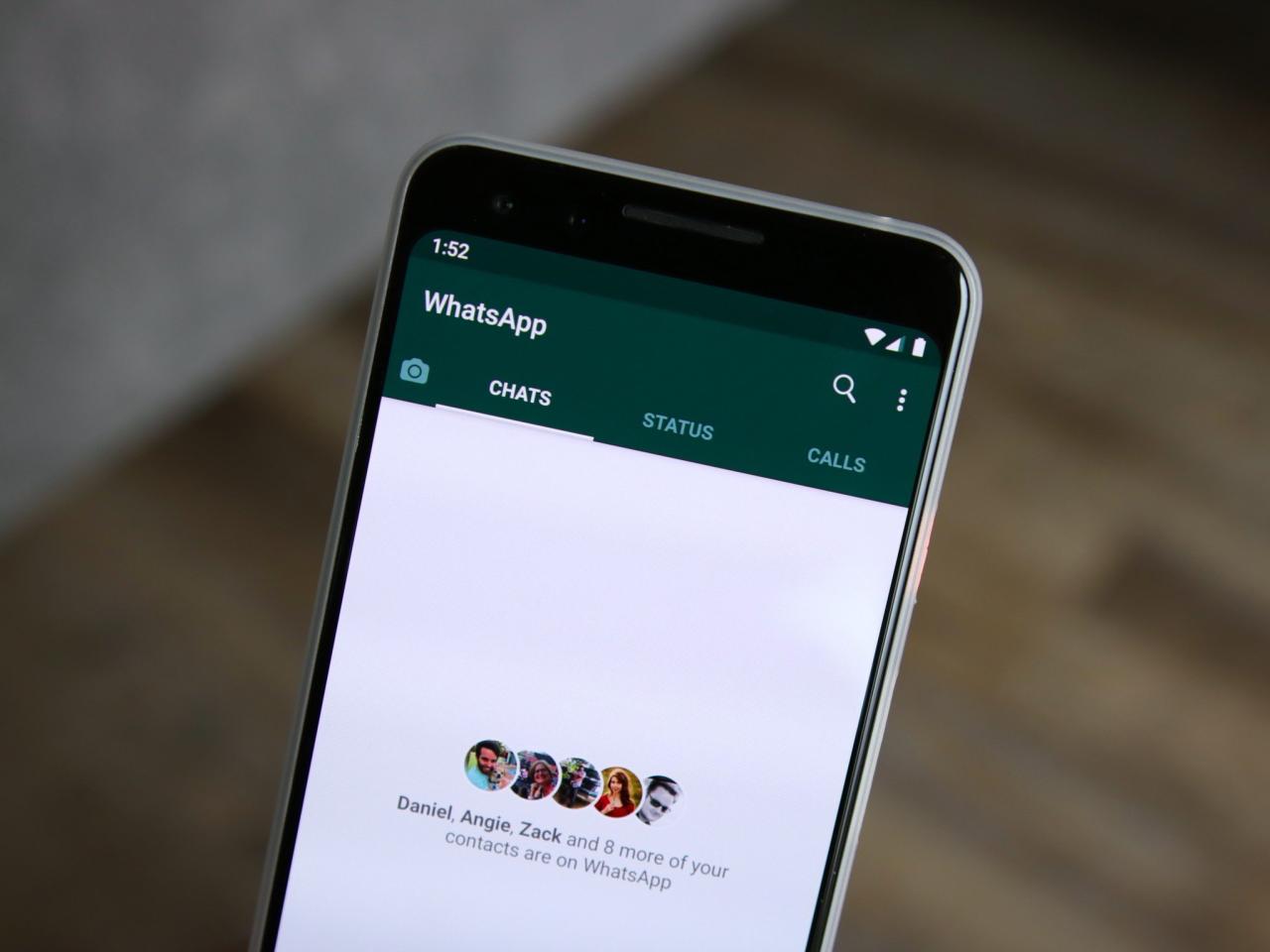WhatsApp tests adding more authentication options beyond biometrics – WhatsApp is experimenting with adding more authentication options beyond biometrics, a move that could significantly enhance the security of the popular messaging platform. This exploration of alternative authentication methods promises to provide users with a more robust and convenient way to protect their accounts.
The current biometric authentication options available on WhatsApp, such as fingerprint and facial recognition, offer a convenient and secure way to access the app. However, by adding more authentication options, WhatsApp aims to further strengthen its security measures and cater to a wider range of user preferences.
Enhanced Security Measures
WhatsApp, the popular messaging app, is enhancing its security measures by adding more authentication options beyond biometrics. Currently, WhatsApp offers biometric authentication options such as fingerprint and facial recognition for added security. However, the company has recognized the need to expand these options to provide users with greater control over their account security.
WhatsApp is rolling out more authentication options to protect your chats beyond biometrics. This move is part of a broader push to enhance privacy and security on the platform. As part of this effort, WhatsApp will boost locked chats privacy and status updates with new features . These updates will make it easier to keep your conversations and personal information safe.
Rationale behind Expanding Authentication Options
The decision to add more authentication options stems from the growing concerns over account security and the need to protect user data. With the increasing prevalence of cyberattacks and data breaches, WhatsApp understands the importance of implementing robust security measures to safeguard user information.
Benefits of Additional Authentication Layers
- Enhanced protection against unauthorized access: Additional authentication layers create multiple barriers that make it more difficult for unauthorized individuals to gain access to user accounts.
- Reduced risk of account takeover: By requiring multiple forms of authentication, the risk of account takeover is significantly reduced, as attackers would need to compromise multiple authentication methods to gain access.
- Increased user confidence: Offering a wider range of authentication options empowers users to choose the methods that best suit their security preferences, thereby increasing their confidence in the security of their accounts.
Additional Authentication Methods
WhatsApp is exploring additional authentication options to enhance account security beyond biometrics. These methods aim to provide users with more flexibility and control over their account protection.
The new authentication options include PINs, SMS codes, and physical security keys. Each method offers unique advantages and disadvantages:
PINs
PINs are numeric codes that users create and enter to access their WhatsApp accounts. They are relatively easy to remember and use, but they are also vulnerable to brute-force attacks if the PIN is short or simple.
SMS Codes
SMS codes are one-time codes sent to the user’s registered phone number. They provide an extra layer of security by requiring the user to have physical access to their phone, but they can be intercepted if the user’s phone is compromised.
Physical Security Keys
Physical security keys are hardware devices that generate unique codes for authentication. They are the most secure option as they require the user to physically possess the key, but they can be inconvenient to carry around and may not be accessible in all situations.
The user experience and convenience of these additional authentication options will vary depending on the individual’s needs and preferences. PINs are the most convenient option, while physical security keys are the most secure. SMS codes offer a balance between convenience and security.
Multi-Factor Authentication: WhatsApp Tests Adding More Authentication Options Beyond Biometrics
Multi-factor authentication (MFA) is a security measure that requires users to provide multiple forms of authentication to access an account or system. This makes it more difficult for unauthorized individuals to gain access, even if they have obtained one of the authentication factors.
WhatsApp plans to integrate MFA into its platform by requiring users to provide a second form of authentication, such as a one-time password (OTP) sent to their mobile phone, in addition to their password. This will help to protect user accounts from being compromised in the event of a password breach.
Benefits of MFA, WhatsApp tests adding more authentication options beyond biometrics
- Increased security: MFA makes it more difficult for unauthorized individuals to access accounts, even if they have obtained one of the authentication factors.
- Reduced risk of account takeover: MFA helps to prevent account takeover by requiring users to provide multiple forms of authentication before they can access their account.
- Improved user confidence: MFA can help to improve user confidence in the security of their accounts.
Challenges of MFA
- Increased complexity: MFA can add complexity to the user experience, especially for users who are not familiar with the technology.
- Potential for user frustration: If MFA is not implemented properly, it can lead to user frustration and inconvenience.
- Cost: Implementing MFA can be costly, especially for large organizations.
Impact on User Privacy

The implementation of additional authentication options on WhatsApp has raised concerns regarding its potential impact on user privacy. The collection and storage of additional biometric data, such as facial recognition and voice patterns, can raise concerns about data security and privacy breaches.
Data Collection and Storage
WhatsApp’s privacy policies state that the additional biometric data collected for authentication purposes will be encrypted and stored securely on WhatsApp’s servers. However, concerns remain about the potential for unauthorized access to this sensitive information by hackers or government agencies.
Furthermore, the use of third-party authentication providers, such as Apple’s Face ID or Google’s Voice Match, raises questions about data sharing and the potential for these companies to access and use user information for their own purposes.
Protecting User Information
WhatsApp has implemented several measures to protect user information, including end-to-end encryption for messages and calls, and the use of secure servers to store data. However, it is important to note that no security system is foolproof, and there is always the potential for data breaches.
Users should be aware of the potential risks associated with providing additional biometric data for authentication purposes and should carefully consider the trade-offs between enhanced security and privacy concerns.
Implementation Challenges
Integrating additional authentication options presents technical hurdles that WhatsApp must overcome. The primary challenge lies in ensuring the seamless integration of new methods without compromising the existing infrastructure and user experience.
Technical Infrastructure
WhatsApp’s massive user base necessitates a robust infrastructure capable of handling the increased load associated with additional authentication methods. Implementing new options requires significant infrastructure upgrades to accommodate the increased data processing and storage demands.
User Experience
The introduction of new authentication options should not hinder the user experience. WhatsApp must strike a balance between enhancing security and maintaining the simplicity and convenience that users have come to expect. Implementing complex or time-consuming authentication methods could potentially deter users from adopting the new measures.
Transition Plan
WhatsApp’s plans to address these challenges involve a gradual rollout of new authentication options, allowing users to adapt to the changes over time. The company will also provide clear instructions and support to ensure a smooth transition for all users.
Industry Trends

In the realm of authentication methods, the tech industry is constantly evolving, driven by the need for enhanced security and user convenience. WhatsApp’s recent move towards incorporating additional authentication options aligns with this industry-wide trend.
Other prominent messaging platforms have also adopted multi-factor authentication (MFA) to strengthen account security. For instance, Telegram offers two-step verification, requiring users to input a code sent via SMS or email along with their password. Similarly, Signal employs end-to-end encryption and allows users to enable an optional screen lock for added protection.
WhatsApp’s decision to introduce multiple authentication methods positions it as a leader in the industry, demonstrating its commitment to user privacy and security. The implementation of these new options is likely to have a positive impact on the overall industry landscape, encouraging other platforms to adopt similar measures to enhance user protection.
WhatsApp’s Approach
WhatsApp’s approach to authentication combines biometrics with additional methods, providing users with a range of options to secure their accounts. This multi-layered approach offers greater flexibility and convenience, allowing users to choose the authentication methods that best suit their individual needs and preferences.
The inclusion of non-biometric methods, such as SMS verification and security keys, ensures that users who may not have access to fingerprint or facial recognition technology can still effectively secure their accounts. This inclusive approach ensures that WhatsApp’s enhanced security measures are accessible to a wider user base.
Potential Impact
The implementation of WhatsApp’s new authentication options is expected to have several positive implications for the industry. Firstly, it will likely drive a broader adoption of MFA across the messaging platform landscape, setting a new standard for account security.
Secondly, it will enhance user confidence in WhatsApp’s platform, knowing that their accounts are protected by robust authentication measures. This increased trust can translate into a competitive advantage for WhatsApp in the crowded messaging market.
Finally, the move towards more secure authentication methods can contribute to a broader shift in the industry towards prioritizing user privacy and security. As users become more aware of the importance of protecting their online accounts, they are likely to demand higher levels of security from all tech platforms.
Ending Remarks
WhatsApp’s exploration of additional authentication options is a testament to its commitment to user security. By providing a wider range of authentication methods, WhatsApp empowers users to choose the options that best suit their needs and preferences. This move towards multi-factor authentication and enhanced security measures is a positive step for the platform and its users.
FAQ Overview
What are the benefits of adding more authentication options to WhatsApp?
Additional authentication options provide increased security by making it more difficult for unauthorized individuals to access user accounts. They also cater to a wider range of user preferences and devices.
How does multi-factor authentication enhance security?
Multi-factor authentication requires users to provide multiple forms of authentication, such as a password and a one-time code sent via SMS or email. This makes it much more difficult for attackers to gain access to user accounts, even if they have one of the authentication factors.
What are the potential challenges of implementing new authentication options?
Implementing new authentication options can involve technical challenges, such as ensuring compatibility with existing devices and maintaining a seamless user experience. WhatsApp will need to carefully plan and execute the rollout of these new options to minimize disruption for users.

One thought on “WhatsApp Tests Expanding Authentication Options Beyond Biometrics”